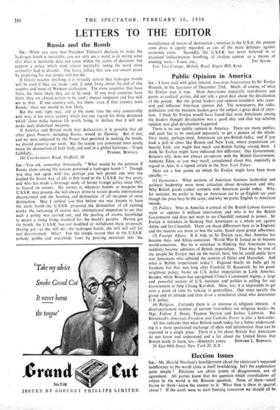Public Opinion in America
SIR. —I have read with great interest American Impressions, by Sir Evelyn Wrench, in the Spectator of December 23rd. Much, of course, of what Sir Evelyn says is true. Most Americans, especially taxi-drivers and guests at cocktail parties, did not talk a great deal about the devaluation of the pound. But the group leaders and opinion:moulders who repre- sent and influence American opinion did. The newspapers, the radio, politicians and the business leaders gave the subject a great deal of atten- tion. I think Sir Evelyn would have found that most Americans among the leaders thought devaluation was a good idea and that top echelon opinion was glad devaluation happened.
There is no one public opinion in America. There are many publics, and each has to be analysed separately to get a picture of the whole. Very many, perhaps most, Americans are pro-British today, and if you took a poll in cities like Boston and New York, where populations are heavily Irish, you might find much anti-British feeling among them. I think Sir Evelyn might have indicated this difference. Our Government, Britain's ally, does not always co-operate with the British Government. Anthony Eden, as you may recall, complained about this, especially in regard to Asia, in a signed article in the New York Times.
Here are a few points on which Sir Evelyn might have been more specific:—
(1) Economics. What sections of American business leadership and political leadership were most articulate about devaluation and why. Why British goods cannot compete with American goods today. Why, for instance, we prefer to buy an American car to an English car even though the price may be the same, and why we prefer English to American tweeds.
(2) Politics. Who in America is critical of the British Labour Govern- ment or opposes it without reservation, and who is for the British Government and does not want to see Churchill restored to power. Sir Evelyn is mistaken in thinking that Americans as a whole are against Attlee and for Churchill. There are sharp differences here as in England, and the reasons are more or less the same, based upon group adherence.
(3) Foreign Affairs. It is true, as Sir Evelyn says, that America has become Asia- and Africa-conscious. World War II forced us to become world-conscious. But he is mistaken in thinking that Americans have suddenly become admirers of British imperialism. That may be true of the people Sir Evelyn met on his travels here, but he could easily have met Americans who admired the systems of Hitler and Mussolini. And what is British imperialism today ? England finally let India get its freedom, but that was long after Franklin D. Roosevelt, by his good- neighbour policy, broke up U.S. dollar imperialism in Latin America. Besides, while Britain has-recognised China's Communist regime, a large and powerful section of U.S. business and politics is yelling for our Government to help Chiang Kai-shek. Here, too, it is impossible to get over a point of view by talking in generalities. One must specify the group and its attitude and then draw a conclusion about who determines U.S. policy.
(4) Religion. Certainly Ahere is an increase in religious interest. A disproportionate number of current best-sellers are religious works—by Mgr. Fulton J. Sheen, Thomas Merton and Joshua Liebman. But Blanchard's American Freedom and Catholic Power is also a best-seller.
All this indicates that what Britain needs today for a better understand- ing is a more specialised exchange of ideas and information than can be reported in a single piece. There is a lot about Britain that Americans do not know and understand and a lot about the United States that Britain needs to learn, too.--Aincerely yours, EDWARD L. BERNAYS. 26 East 64th Street, New York 21, N.Y.


































 Previous page
Previous page